"Youth leaders of color [are] under attack," Black Lives Matter-Minnesota said in a statement. "It’s clear that the Bloomington City government, at the behest of one of the largest centers of commerce in the country, hopes to set a precedent that will stifle dissent and instill fear into young people of color and allies who refuse to watch their brothers and sisters get gunned down in the streets with no consequences."
Around 3,000 people flooded the mall on Saturday, December 20, to sing carols and chants following police killings of unarmed African-American men like Eric Garner, Michael Brown, Tamir Rice, and Dontre Hamilton. The protests were peaceful, and some mall workers stepped outside of their businesses and raised their hands in support. Police closed around 80 stores during the two-and-a-half hour protests, and locked down several mall entrances.
Days after the action, Bloomington City Attorney Sandra Johnson announced that she will not only seek criminal trespass and unlawful assembly charges against the protesters, but will also seek to have them pay for the mall's lost revenue and overtime for police officers--a cost that she says will be "staggering."
Can the Mall of America prohibit the exercise of free speech and assembly on its premises? And can it pick-and-choose who it allows to assemble? Last year, for example, the Mall allowed around 7,000 people to gather in the same rotunda to honor a young white man who died of cancer.
The First Amendment protects against government suppression of speech, but not private responses to the exercise of free speech and expression. And the Mall of America is considered private property, despite receiving hundreds of millions in public subsidies since it was built, including an additional $250 million approved last year.
For decades, courts have struggled with how to protect free speech in public forums that have grown increasingly privatized.
Mall "Born of a Union with Government," but Not a Public Space
In many communities, town squares and downtown business districts have largely been replaced by privately-owned shopping malls, particularly in suburban areas. In Bloomington, Minnesota, for example, there is no public space that offers the same level of visibility as a protest at the Mall of America--which is why protesters chose the location on December 20.
Even traditional public spaces like parks are increasingly owned by private entities, most famously in New York's Zuccotti Park, where Occupy Wall Street was born, and where Occupiers faced eviction after the park's owners changed the rules.
Mall of America's status as a public space under the Minnesota state constitution was challenged in the 1990s by anti-fur activists who wanted to protest outside Macy's. A Minnesota trial court initially found that, thanks to the Mall's substantial public subsidies, the Mall of America was "born of a union with government" and could only impose reasonable time, place, and manner restrictions on protest.
The Minnesota Supreme Court, though, reversed the lower court in 1998 and declared that the state constitution's protection of free speech "does not apply to a privately owned shopping center such as the Mall of America, although developed in part with public financing."
Suburban Malls as Public Spaces?
Initially, however, the U.S. Supreme Court viewed privately-owned suburban shopping malls through the same lens as the public town squares they were replacing.
In 1968, in an opinion authored by Justice Thurgood Marshall, the Court held that suburban shopping malls were serving the same public function as a town square, and therefore should be subject to similar constitutional constraints.
"The shopping center premises are open to the public to the same extent that as the commercial center of a normal town," Marshall wrote in the case, which involved the Logan Valley Mall in Pennsylvania. "So far as can be determined, the main distinction in practice between use by the public of the Logan Valley Mall and of any other business district ... would be that those members of the general public who sought to use the mall premises in a manner contrary to the wishes of the [owners] could be prevented from so doing."
Subsequent decisions, however, chipped away at that "public function" doctrine, most notably in a 1972 decision authored by Justice Louis Powell.
Powell, a former corporate lawyer who had authored the Powell Memo for the U.S. Chamber of Commerce the previous year, declared in the Lloyd Corp. v. Tanner decision that a mall does not "lose its private character merely because the public is generally invited to use it for designated purposes."
A new opening for states to protect free speech in shopping malls emerged in the 1980 Pruneyard Shopping Center v. Robbins decision. In that case, the Court opened the door to states finding that their own constitutions protect free speech in shopping malls or other privately-owned public spaces. The California constitution's broader free speech protections, for example, allow for protests and leafletting in that state's malls.
Minnesota's Supreme Court, though, came to a different outcome in that 1998 case involving the fur protesters. The state constitution, the justices declared, does not bar Mall of America's owners from limiting the exercise of free speech on mall property, or choosing to allow some forms of speech but not others.
"The Poorly Financed Causes of Little People" Yield to Corporate Rights
In recent years, the First Amendment has undergone a revolution in the U.S. Supreme Court--in cases like Citizens United, Hobby Lobby, and McCutcheon--but largely in favor of expanding the "free speech rights" of corporations and the wealthy few, rather than protecting what Justice Hugo Black described in 1945 as "the poorly financed causes of little people." When average Americans raise their voices in protest, they can still be muffled by corporate interests.









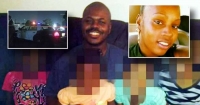


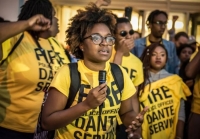












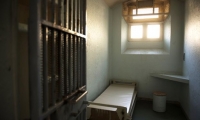













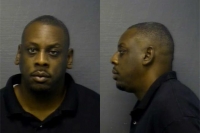




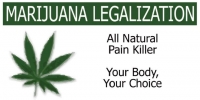





















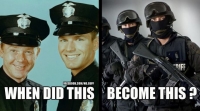

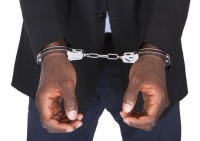







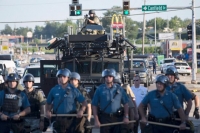



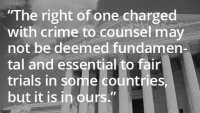


















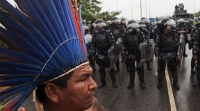










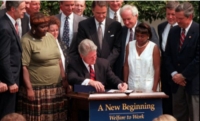










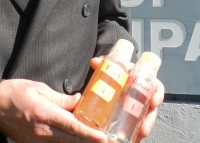
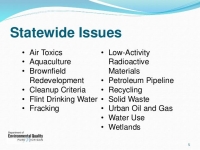





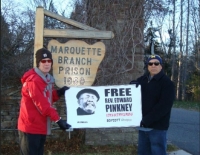






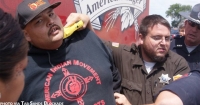






















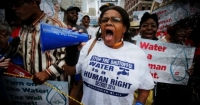







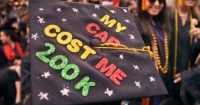






 Imagine going to the polls on Election Day and discovering that your ballot could be collected and reviewed by the
Imagine going to the polls on Election Day and discovering that your ballot could be collected and reviewed by the On a night of Democratic victories, one of the most significant wins came in Virginia, where the party held onto
On a night of Democratic victories, one of the most significant wins came in Virginia, where the party held onto A seismic political battle that could send shockwaves all the way to the White House was launched last week in
A seismic political battle that could send shockwaves all the way to the White House was launched last week in In an interview with Reuters conducted a month after he took office, Donald Trump asserted that the U.S. had “fallen
In an interview with Reuters conducted a month after he took office, Donald Trump asserted that the U.S. had “fallen